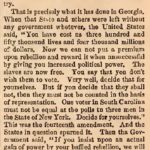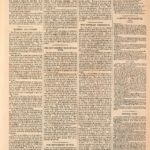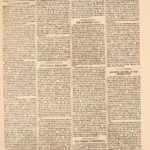Way back in its October 24, 1868 issue Harper’s Weekly seemed a bit miffed by a letter from Georgia, which asked a question: if universal suffrage for black men is such a good thing, why doesn’t the North adopt it? The editorial responded by saying that although voting qualifications were up to the States, the federal government had more say in the ex-Confederacy because of all the blood and treasure expended during the rebellion. The argument also touched on the original 1787 Constitutional compromise – if Georgia decides not to allow black men to vote, it can’t still count the African-American population to determine the number of representatives in Congress and the Electoral College. Because the Southern States wanted to do that, Congress passed the Reconstruction Acts. The editorial seemed to give New York State a pass (“Colored suffrage is a matter of State policy in the largest sense.”) but did say that it urged the people of New York State to adopt “perfect equality at the polls” (at least for men).
The paper seems to have modified its position somewhat a few months later. In its February 13, 1869 issue Harper’s Weekly commented on a pending revision to the New York State constitution. Although a state constitutional convention had agreed to a new constitution in 1868, it hadn’t been voted on yet. If a bill in the state legislature passed, there would be an election with two ballot boxes – one for the new constitution as a whole and one for a clause that would eliminate the property qualification for black men:
…It is time that the absurd and barbarous discrimination against certain voters because of the color of their skin should be abolished, and it is humiliating that in such a State as New York there should be such a blot upon the present Constitution. A colored citizen, however intelligent, industrious, and prosperous, must have lived twice as long in the State as the rest of us and pay a tax, which is imposed upon nobody else, as the price of the right of suffrage. …
So the paper stuck to its guns that New York voters should ensure equal voting rights for all adult male citizens, but in a second editorial on the same page it seemed to no longer maintain that voting rights law was only a state issue. It endorsed the suffrage amendment that had been recently introduced in Congress. Harper’s saw the proposed 15th amendment to the United States Constitution as sort of a natural extension of Republican Party ideals and reconstruction policy. Congress had the power to legislate equal suffrage, but an amendment would be more permanent and less objectionable to those who thought states should have the right to determine voting qualifications. The amendment wouldn’t infringe on the people’s right to determine suffrage because it would enforce the will of the people as a whole nation.
… The amendment is a also a measure of wise consolidation. It touches no right of which any State can justly be jealous, or which it can reasonably deny to the United States. The first essential condition of a popular national government is the equality of its citizens equally secured. Ours, indeed, is not a national government in the simplest form; but, on the other hand, it is not a league nor a confederacy of States. It is a national Union. It has a national substance and necessity, and the attempt to regulate a national policy upon the theory of State sovereignty as hitherto maintained is futile. The adoption of the amendment will be the declaration of the people that they perceive the legitimate conditions of a truly national Union.
It will also tend rapidly to remove an exciting question from politics. It is plain now that the current of our political progress, for more than a generation, has been toward the political equality of all the people. The Democratic party, which is the organized opposition to this result, has been constantly defeated upon every field, but still perplexes and delays it. The Democratic representatives in Congress voted in a body against the amendment, upon the ground that it was a subject to be left to the States, thus conceding to possible majority in a State the right to deprive a citizen of the United States of his share in its government, and to establish an unrepublican form if it should choose. But the Republican party, whose watchword is a constantly enlarging liberty as a condition of increasing intelligence, moves with the fraternal spirit of the age, and will not have accomplished its work until it has placed the United States in the hands of all the people.
According to Wikipedia Congress passed the amendment on February 25 and 26, 1869. The New York state legislature ratified it on April 14th. In its May 1, 1869 issue Harper’s Weekly claimed that the Democratic party was using racial fears and prejudices to oppose the Equal Suffrage amendment in the states. (There seems to be a contradiction between the Wikipedia article and the paper’s claim that twenty-one states had already ratified the amendment.)
Of course, eventually the suffrage amendment did become the 15th to the U.S. Constitution, but, according to the Historical Society of the New York Courts’ website, New York didn’t adopt a new constitution in 1869. The 1846 state constitution was still operational. Here’s what it had to say about suffrage:
ARTICLE II.
Section 1. [Qualifications of voters.]—Every male citizen of the age of twenty-one years, who shall have been a citizen for ten days, and an inhabitant of this state one year next preceding any election, and for the last four months a resident of the county where he may offer his vote, shall be entitled to vote at such election in the election district of which he shall at the time be a resident, and not elsewhere, for all officers that now are or hereafter may be elected by the people; but such citizen shall have been, for thirty days next preceding the election, a resident of the district from which the officer is to be chosen for whom he offers his vote. But no man of color, unless he shall have been for three years a citizen of this state, and for one year next preceding any election shall have been seized and possessed of a freehold estate of the value of two hundred and fifty dollars, over and above all debts and incumbrances charged thereon, and shall have been actually rated and paid a tax thereon, shall be entitled to vote at such election. And no person of color shall be subject to direct taxation unless he shall be seized and possessed of such real estate as aforesaid.
§ 2. [Exclusion from right of suffrage.]—Laws may be passed, excluding from the right of suffrage all persons who have been or may be convicted of bribery, larceny, or of any infamous crime; and fordepriving every person who shall make, or become directly or indirectly interested in, any bet or wager depending upon the result of any election, from the right to vote at such election.
§ 3. [Right of suffrage not affected by certain occupations and conditions.]—For the purpose of voting, no person shall be deemed to have gained or lost a residence by reason of his presence or absence, while employed in the service of the United States; nor while engaged in the navigation of the waters of this state, or of the United States, or of the high seas; nor while a student of any seminary of learning; nor while kept at any almshouse or other asylum, at public expense; nor while confined in any public prison.
§ 4. [Registration of voters.]—Laws shall be made for ascertaining, by proper proofs, the citizens who shall be entitled to the right of suffrage hereby established.
§ 5. [ Elections to be by ballot.]—All elections by the citizens shall be by ballot, except for such town officers as may by law be directed to be otherwise chosen.
Voting rights were a major issue during the 1821 New York State constitutional convention:
The changes in the suffrage, however, aroused much more controversy and proved far more significant. The old constitution prescribed the possession of a twenty-pound freehold or the payment of a yearly rent of forty shillings as qualifications of voters for assemblymen. To vote for senator and governor the citizen had to possess still more property. To the dismay of the Federalists, the Republicans advocated clauses permitting voters to qualify by payment of taxes, by service in the militia, by work on the roads, or by established residence. In short, the Republicans were proposing the equivalent of universal manhood suffrage for white voters.
During the convention the Federalists didn’t deny that all citizens had rights to life and liberty but maintained that property owners had rights that poor people didn’t. Chancellor James Kent noted that in 1820 the population of New York City was almost six times larger than in 1773. “It is rapidly swelling into the unwieldy population, and with the burdensome pauperism, of a European metropolis. New-York is destined to become the future London of America; and in less than a century, that city, with the operation of universal suffrage, and under skillful direction, will govern this state.” Mr. Kent also warned that universal suffrage couldn’t be tried experimentally – once voting rights increase they can’t be removed – except “by the strength of the bayonet.”
Democratic-Republican Erastus Root denied that property had anything to do with suffrage. “…We are all of the same estate – all commoners.” The Federalists lost the battle. The constitution retained property qualifications for black men, but “virtual universal suffrage was established for white males.”[1]
Going back a bit further, yesterday I found out that the handwritten manuscript draft of New York’s first constitution is on display this week at the New York State Museum and State Archives in Albany. “The complete, official text was published as the state constitution in Fishkill in 1877. It was officially adopted in Kingston on April 20, 1777, establishing New York as a state.” There is no extant final copy; historians think it might have been destroyed in Fishkill. (The Post-Standard (Syracuse, New York) April 14, 2019 page A2). Get a glimpse here; read the finished document here – it includes the Declaration of Independence.
- [1]Ellis, David M., James A. Frost, Harold C. Syrett, and Harry J. Carman. A Short History of New York State. Ithaca, New York: Cornell University Press, 1957. Print. page 147.↩



